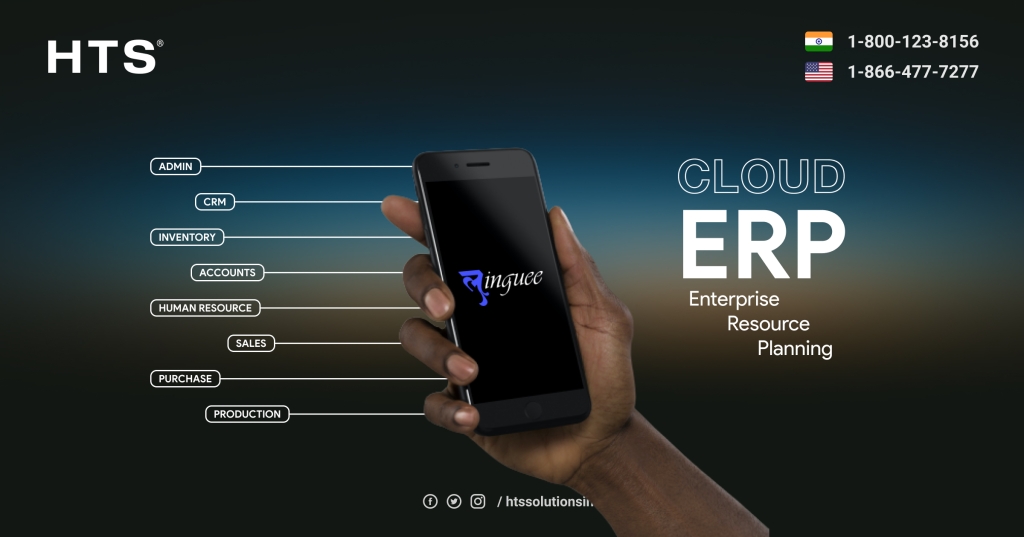
Enterprise Resource Planning
Before delving into Cloud ERP, it is important to understand what an ERP software is. It is known to all that managing a business involves many intricacies. An Enterprise Resource Planning (ERP) software provides a perfectly designed business management solution to companies of every size and from various industries. The core business processes of an organization are integrated and managed by an ERP tool by collecting, managing, storing and interpreting data that is from a wide range of business activities. An ERP tool uses a customized suite of integrated applications for automating and streamlining the whole process, which results in an increase in efficiency and reduction in human errors. An ERP software is used by the various departments of a company, such as the accounts, administrative, purchase, production, human resource, inventory, sales, customer relationship management, to name a few.
An ERP tool proves to be a boon to an organization in many ways, such as, streamlining and simplifying workflows that are lengthy, monitoring and managing daily operations, increasing operational efficiency as well as productivity, accelerating response times with the aid of an integrated database, providing daily operations’ real-time data, facilitating business data analysis to make informed decisions. It is also useful in eliminating chaotic data transfer, security gaps and the scope for human errors. This is made possible by integrating separate work processes into one system that is accessible via a unified interface. This type of software, which serves the additional purpose of meeting customer expectations, not only saves time buts also saves operational and administrative costs.
An ERP software is an integrated system that operates in (or near) real time. This is common to all the ERP software packages, along with certain other characteristics. These characteristics include a modular design with a consistent look and feel across modules, along with deployment options that include on-premises, cloud hosted or SaaS. Every ERP tool has a common and open database that is flexible and supports all the applications.
There are many ERP software that have earned the reputation of being the “Best Enterprise Resource Planning Software”. One such ERP software that deserves to be mentioned is Linguee, which is renowned as not only the Best Enterprise Resource Planning Software but also as the Best ERP Accounting Software in India and as the Best Free GST Billing Software in India because it gives its users an edge over their competitors by the virtue of being designed to perfection with regard to meeting the requirements of industries from diverse fields.
Cloud ERP
A Cloud ERP denotes an enterprise resource planning (ERP) system that functions on the cloud platform of a vendor. This enables organizations to access it over the Internet. It is hosted by an ERP vendor and is made available to businesses as a service. It provides at least the same but usually better functionality when compared with its on premise counterparts. What differentiates a Cloud ERP from an on-premises ERP is not only the physical location of the ERP software but also certain characteristics that provide many advantages to a cloud ERP software’s users. Every cloud ERP software exists on a server in a data center that belongs to a particular ERP vendor. The user accesses it over an active Internet connection. In the cloud ERP setting, the ERP software and its data is managed centrally by the vendor.
A cloud ERP tool proves to be especially beneficial to small and medium-sized businesses as the benefits of an ERP can be reaped at a reasonable price without incurring a substantial expenditure that is related to hardware and software. Moreover, the updates are taken care of automatically by the ERP vendor.
Advantages of Cloud ERP
Data can be accessed remotely with the aid of cloud technology eliminating the need for complex technical configuration. Cloud technology offers the benefit of being more scalable when it comes to storing large volumes of data. Faster implementation is another advantage that is provided by cloud ERP systems. In the event that an organization either lacks or cannot afford the necessary resources and infrastructure that is needed, which cloud vendors have, cloud ERP provides an ideal solution by allowing such organizations to outsource the needed cloud technology. This helps organizations to focus on their core competencies. Moreover, the initial cost related to cloud technology is low. Cloud vendors provide ERP solutions that are reasonably priced and are usually customized as per the client’s budget.
Since cloud technology is easier to use than its on premise counterpart, there is less resistance on the part of the employees to use it. Some organizational cultures are such that there is more acceptance for cloud ERPs than an on premise one. Last but not the least is the security aspect. Cloud ERP vendors specialize in providing extremely secure hosting environments which is an important advantage.
Conclusion
An Enterprise Resource Planning (ERP) software is an automated solution meant to improve operational efficiency and productivity of an organization. Opting for a cloud ERP software has many advantages, such as making the service available and accessible at any time from any place with a device that has an active Internet connection. With many other benefits, cloud ERP software have made managing complex business activities easier, effective and time-saving.
Source: https://www.linguee.in/blog/2021/02/16/the-benefits-of-cloud-erp-software/



